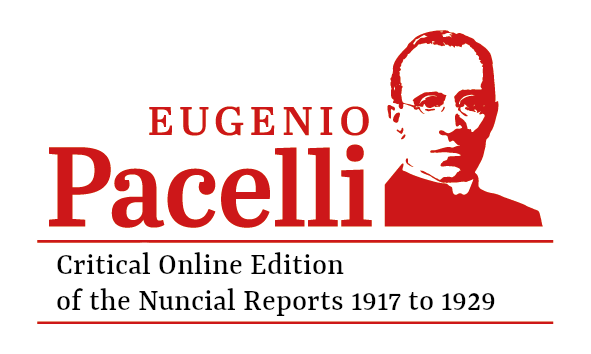Documentation
When in 2003 and 2006 all documents pertaining to the pontificate of Pius XI (1922-1939) kept in the Vatican Apostolic Archives were made accessible the opportunity arose to edit the nuncial reports Pacelli sent to the Roman Curia during his twelve years as nuncio in Germany. His reports and the directives received from various Roman institutions are gathered, edited critically, annotated, evaluated and made available to scholars and a broad international public.
In order to ensure the edition's international reception, the website is also available in English. On both the German and the English websites, the documents, however, are exclusively reprocued in the respective original language. The annotation of the documents, biographies and keywords as well as the summaries are offered in German throughout.
In the present edition, the most important coherent source corpus on German Catholicism during the Weimar period is published. It reflects far more than Pacelli's view of Catholicism and the German Church, as it sheds light on his judgements on political, social and cultural developments as well as on everyday life in the Weimar Republic. The nuncio reported on important events such as the Hitler putsch of 1923, the occupation of the Rhineland or the election of Hindenburg as Reich President in 1925 as well as on women's sports and birth control. Of course, he also addressed anti-Semitism. Pacelli looked far beyond Germany; he wrote detailed reports on Eastern Europe, more specifically on the USSR. The fact that the Berlin nunciature functioned as a sort of hub for the Vatican's European and world politics makes the sources indispensable for transnational research.
Both the drafts of the nuncial reports kept in the archives of the nunciatures in Munich and Berlin and the final versions, which are principally kept in the archives of the Secretariat of State and the Congregation for Extraordinary Ecclesiastical Affairs, have been almost fully preserved. This enables us to reconstruct the genesis of the reports and to trace Pacelli's "teamwork" with his staff, especially with the auditors Lorenzo Schioppa and Luigi Centoz. The online format gives us the opportunity to display the various corrections made by the respective editors in different colours.
The information provided by Pacelli shaped the curial "view from Rome" on Germany. Our edition grants important insights into the Vatican's decision-making processes between the poles of controlled procedures within the congregations and commissions on the one hand and informal soundings beyond the official curial institutions on the other. Apart from that, we are given fundamental, almost intimate insights into Pacelli's biography, his character and his way of working and thinking. Ultimately, the decisions Pacelli arrived at as Pope Pius XII can only be understood against the background of his entire biography. After the papal peace initiative of 1917 had failed, his experiences in Germany made him internalise the Holy See's absolute non-partisanship in international conflicts as well as the primacy of pastoral care over all other ecclesiastical tasks as guiding principles.
The edition was funded by the German Research Foundation (DFG) as part of a twelve-year long-term project.
The documents successively went online, year by year:
- On 24 March 2010, the documents of 1917 went online.
- On 2 March 2011, the majority of the documents of 1918 went online.
- On 14 January 2013, the reports and directives of 1920 went online.
- On 20 December 2011, the directives of 1917 and 1918 as well as selected nuncial reports and directives quoted in the conference volume "Eugenio Pacelli als Nuntius in Deutschland" went online.
- On 5 June 2012, the reports and directives of 1919 went online.
- On 15 May 2013, the reports and directives of 1921 went online.
- On 31 July 31 2013, the reports and directives of 1922 went online.
- On 29 September 2014, the documents of 1923 went online, including Pacelli's private correspondence with the substitute in the Secretariat of State, Giuseppe Pizzardo.
- On 18 September 2015, the documents of 1924 went online, altogether approximately 1,650 new documents.
- In June 2016, the documents of 1925 went online, altogether more than 1,600 documents.
- In March 2018, the documents of 1926 went online, altogether more than 1,780 documents.
- On 25 February 2019, the documents of 1927 went online, altogether 1,050 documents.
- On 28 June 2019, the homepage was relaunched.
- On 20 January 2020, the reports and directives of 1928 and 1929 went online. With that, the entire source corpus including 20,848 individual documents is now available online.
- On 26 January 2022, the English homepage was launched.
